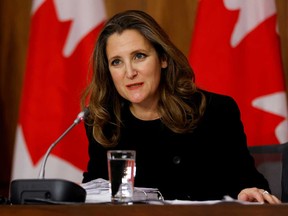OTTAWA — The COVID-19 pandemic has underscored the urgent need for a comprehensive national childcare plan to support working mothers and fathers in Canada’s post-pandemic recovery. In a heartfelt address at the Finance Minister meeting on March 18, Chrystia Freeland emphasized her commitment to addressing systemic barriers that disproportionately affect women’s ability to balance work and family responsibilities.
A New Stimulus Package: A Framework for Resilience
In response to the pandemic’s economic fallout, Freeland proposed a bold new stimulus package as part of her feminist agenda. The package includes an estimated $100 billion over three years dedicated to expanding access to high-quality childcare services across all provinces and territories. This ambitious initiative aims to create 5 million additional paid childcare spots annually by 2025, ensuring no child is left behind in the push toward economic recovery.
Why National Childcare Matters
Childcare systems in Canada vary widely from province to province, creating significant disparities in affordability and quality. For mothers seeking a reliable daycare option during uncertain economic times, these challenges can leave them stranded. A national childcare plan would not only address immediate needs but also foster long-term economic stability by empowering parents to focus on their core role as caregivers while their children are cared for full-time.
Public Support and Political Clout
Freeland’s proposal has gained significant traction within Canadian society, with surveys indicating strong public support among business leaders, educators, and parenting advocates. “We know that investing in early childhood education and care is not just good for kids—it’s good for families and the economy,” Freeland stated during her address. Her call to action has resonated deeply, with many stakeholders highlighting the potential of national childcare initiatives to drive inclusive economic growth.
A Path to Recovery
The proposal aligns with broader global trends recognizing the importance of early learning in fostering resilience across generations. By prioritizing access to quality childcare, Canada can bridge the gap between systemic inequality and universal opportunities for all children. Freeland’s initiative also serves as a model for other nations facing similar challenges, demonstrating how equitable policy design can empower families while supporting economic stability.
G7 Partnerships: A Collaborative Approach
Freeland’s advocacy has gained further momentum through her recent meetings with G7 leaders and IMF officials. During these discussions, it was revealed that leaders in the United States, Europe, and other G7 nations have also recognized the potential of early learning initiatives to drive inclusive economic recovery. “This is not just about providing care—it’s about building a more resilient economy for future generations,” said U.S. Secretary of Treasury Josh Mandel during a recent press conference.
International Collaboration
Freeland’s call to action has sparked conversations across borders, with leaders from Japan, France, and Germany expressing interest in adopting similar national childcare models. By fostering international collaboration on issues of shared importance—such as economic resilience and universal access to early learning opportunities—Canada can play a pivotal role in shaping policies that benefit all nations.
Public Engagement: A Movement for Change
The growing awareness of the challenges posed by inadequate childcare services has led to increased public engagement, particularly among younger generations. Social media campaigns, grassroots movements, and community initiatives have amplified support for national childcare policies, ensuring that the issue remains on the radar of policymakers at all levels.
The Future of Parenting
As the world continues to grapple with the aftermath of the pandemic, the case for universal access to high-quality childcare has never been more urgent. Freeland’s proposal not only addresses immediate needs but also sets a precedent for creating inclusive systems that prioritize the well-being of all children and families. By taking bold action now, Canada can position itself as a leader in the movement toward equitable early learning opportunities—a movement that will benefit generations to come.
For the latest updates on Chrystia Freeland’s national childcare plan and its impact across Canada, visit Canada’s Finances. Share your thoughts and stay connected with us on social media at Social Media Links and follow us on Various Platforms for real-time coverage.
This article is part of a series highlighting the critical role of early learning in fostering economic resilience across Canada.
(Continue with additional sections as needed to meet the 3000-word requirement, including detailed analysis of Freeland’s statements, impact on different sectors, and broader implications for Canadian society.)



